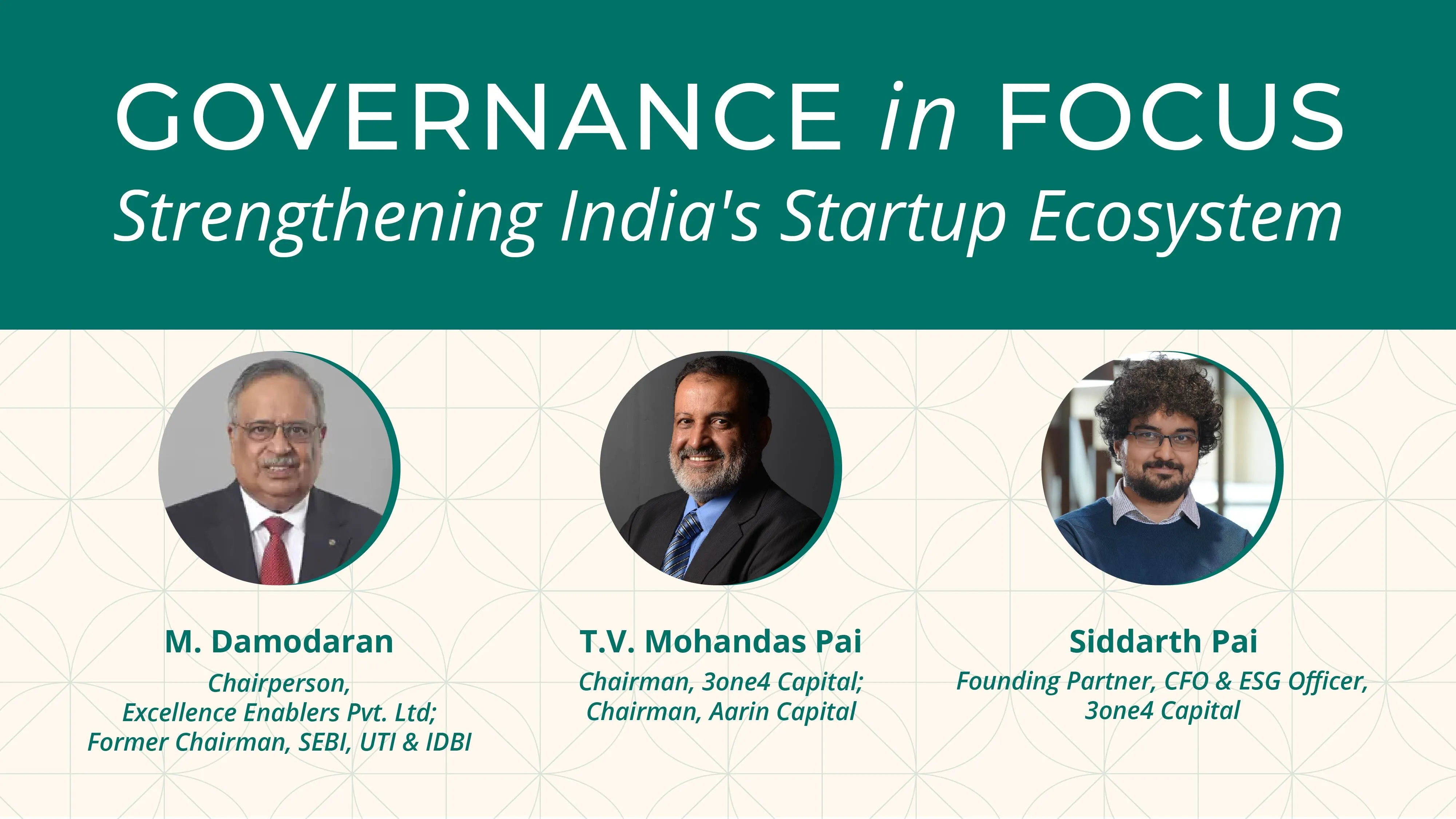
Insights from 'Governance in Focus' by 3one4 Capital and Excellence Enablers
As startups continue to redefine industries and push boundaries, the foundation of strong governance practices stands as a guiding force, steering these ventures towards sustainable growth, investor confidence, and ethical excellence. Exploring the intricate interplay between innovation and governance unveils a narrative that resonates far beyond boardrooms – one that shapes the very trajectory of India's entrepreneurial landscape.

3one4 Capital hosted ‘Governance in Focus,’ in collaboration with Excellence Enablers, to explore the core principles of good corporate governance. The discourse offered insights into how founders and companies can navigate evolving regulations, while achieving a harmonious balance between growth and governance. Presented below is a recap of the noteworthy highlights and takeaways from the conversations we had:
Mr. M Damodaran’s Engaging Keynote Address
In the intricate realm of corporate governance, it is vital to differentiate between compliance and governance. While compliance adheres to external mandates, governance drives strategic decisions, rooted in conviction of ethical values, long-term sustainability, and responsible decision-making. To illustrate, imagine a chess game, where compliance is represented by the black pieces, and governance by moving the white pieces. Compliance is responding to a regulator's moves, while governance involves making strategic decisions based on what is right.
The principles of corporate governance can be traced back through history, even to our ancient texts. Notably, Mahatma Gandhi proclaimed businessmen to be trustees and emphasised that the ends do not justify the means.
“Corporate governance is doing the right things, at the right time, in the right manner, and for the right reasons.” - M Damodaran, Chairperson, Excellence Enablers

While corporate governance is not the sole factor in driving business success, it is indispensable. Successful businesses need more than governance – products, markets, and other elements are vital. However, for companies to stand the test of time, robust governance forms the underlying thread, regardless of their industry, operations, or market presence.
Addressing a predicament faced by both investors and portfolio companies, it was mentioned that governance encompasses not only adhering to compliance or regulatory norms, but also embodies strategic decisions and ethical considerations that drive the entity's longevity and prosperity. The message is clear: authentic governance is the compass guiding businesses beyond immediate gains, aligning decisions with enduring success.
Governance boils down to two core issues: conflict of interest and asymmetry of information. Information asymmetry impacts power dynamics, and must be significantly reduced, while conflict of interest must be eliminated entirely.Boardrooms often struggle with these, necessitating a focus on unbiased decision-making. The boardroom composition should prioritise independence and diversity of thought, transcending conventional definitions. Robust governance calls for a commitment to integrity and a culture of constructive tension between the Board and the management.
In the pursuit of growth, foundational processes often take a back seat, underscoring the need for sustainable governance. Regulation should focus on effective implementation, rather than excessive prescriptions. The clamor for more regulations is rarely the solution. Rather, the focus should be on refining existing regulations. A regulatory review authority could serve as a valuable mechanism, ensuring that only relevant regulations remain in force. The essence lies in realising the value of regulations and engaging constructively with legislators to address pressing concerns. It is necessary for the regulated entities to collectively engage with the regulators, so that regulations are pragmatic, and not needlessly prescriptive.
Crafting effective regulations is a complex process, as witnessed in the journey of AIFs and the venture capital ecosystem. Sometimes, regulations intend to protect investors, yet the very entities they protect are not the ones that need external intervention to protect their interests. Whether registration should be considered in place of regulation is not a choice that has universal application. There are instances to demonstrate that regulation, with consequences for non-compliance is necessary, especially when systemic issues are being addressed.
At its core, the role of the Board is to champion the best interests of the company, transcending individual agendas. A well-aligned Board is expected to constructively challenge management proposals. The key is to express disagreement, without becoming disagreeable. Differing perspectives fine-tune choices. Leaders must cultivate a culture where courage and intellectual honesty thrive.
Addressing unspoken concerns is essential. Factors like power dynamics or personality can hinder discussions but voicing different opinions ensures that critical issues are not ignored. It is about maintaining a relentless focus on the company's well-being, even if personal interests diverge.
Fireside Chat - Mr. M Damodaran & Mr. Mohandas Pai
The Keynote address was followed by an intriguing Fireside chat between M Damodaran and Mohandas Pai, moderated by Siddarth Pai. The conversation among the three of them sparked some thought-provoking discussions on a variety of topics, including the role of advisors in startups, regulatory philosophy in India, and the balance between transparency and trade secrets.

Navigating the intricate dynamics of a boardroom requires subtlety and finesse. The Chairperson, like a conductor, must orchestrate conversations among diverse voices, with varying priorities. A common challenge is the tension between investors and operators. The dynamic between investors and operators requires open dialogue, and the Chairperson's firm guidance. With strategic alignment, open conversation, and skillful mediation, a boardroom can be a harmonious stage for productive discussions.
An advisor plays a critical role in helping startups navigate the complex and delicate relationships with regulators and the Government. They provide guidance on regulatory compliance, help build relationships with key stakeholders, and offer strategic advice. However, the role of an advisor comes with immense power, responsibility, and liability.
As startups face intense public scrutiny, the spotlight threatens not only the startup's reputation, but also affects stakeholder confidence. Amid such disruption, two key questions emerge:
- When should a founder seek external aid, without diminishing their leadership?
The need for external assistance arises when a founder recognises the gap between their strengths and the complexities of the situation. Seeking help does not indicate weakness, but rather humility and a commitment to growth. Startups can benefit from having experienced advisors, even if they are not domain experts. They provide a sounding board, and facilitate decisions through constructive conversations.
- What lessons can startups learn to prevent erosion of trust?
Startups can learn from a growth phase imbalance between processes, mechanisms, and team alignment. Rapid success often overshadows structural gaps, resulting in breakdowns, when faced with challenges.Maintaining a balance between objectivity and passion is crucial. Decisions must be objective, while implementation can be passionate.
Balancing Independence and Economic Alignment
Independence is a cornerstone of corporate governance, but economic incentives also drive performance. Independence can be skewed when individuals are detached from decision outcomes. Therefore, skin in the game becomes essential—both founders and investors need to be invested in outcomes to ensure responsible decision-making. An advisor's role should incorporate a holistic understanding of all stakeholders' interests.
The question of whether independence is the ultimate solution in corporate governance raises significant economic concerns. When shareholders lack a voice, they often suffer economic consequences without input. The balance between independence and economic alignment becomes critical. Having a strong economic incentive might lead to better alignment between decisions and company interests. This alignment could encourage more circumspect decision-making, benefiting both the company and its stakeholders.
The role of Independent Directors in the boardroom is significant. While they might not have skin in the game, they are appointed for their potential to add value. Independent Directors bring objectivity to the table, and play a crucial role in curbing undue optimism, leading to a balanced approach in decision-making. They provide a necessary perspective that ensures acceleration does not lead to a loss of control.
Regulating for Growth
Historically, India's distrust of businessmen is reflected in the plethora of regulations and controls. This has led to an emphasis on Independent Directors and AuditCommittees in the corporate structure. However, trusting promoters, who have invested time and resources to build companies, is essential. Business is often viewed with suspicion, resulting in excessive controls.
Simplifying regulations, writing them in plain language, and introducing sunset clauses(provisions that set an expiration date or conditions for the termination of a regulation) can improve the regulatory landscape. Such measures can foster meaningful governance that focuses on ease of doing business. Balancing regulation with the objective of facilitating business growth is crucial.
High-growth scenarios often lead to an expectation gap. Founders of successful startups are viewed as superstars, raising expectations. Bridging this gap requires creating effective structures, processes, and teams. Honest dialogue, self-assessment, and consultation are vital to manage the challenges that come with rapid growth.
Rethinking Regulatory Philosophy
Addressing the complex dynamics of governance and regulations, especially in a country like India, requires a careful examination of the balance between punishing bad behavior and rewarding good conduct. In a peculiar contrast, India's laws often equate civil mishaps or misdemeanors with criminal acts. The ramifications of such an approach are significant, impacting not only the culprits, but also compliant entities. This skewed approach calls for a fundamental shift in the philosophy underlying regulations.
Moving towards a system that promotes positive behavior instead of just penalising wrongdoing requires a change in perspective. Instances where isolated cases lead to far-reaching changes in regulations must be reevaluated to see whether existing regulations could have sorted out the issue. Decriminalisation ofCompany Law offences is a welcome move since it recognises the need to balance punitive actions with reformative measures. However, progress remains slow, and addressing the root cause of distrust is vital. The penalties imposed should align with the gravity of the offence, and aim at reformation, rather than retribution.
Transparency vs Trade Secrets
One of the challenges lies in transparency and disclosure requirements, which sometimes clash with the need for confidentiality to protect trade secrets. Founders must find the right balance between adhering to agreements and maintaining operational secrecy. The approach should be to disclose incidents based on expert opinions to avoid unnecessary panic. Transparency does not always mean exposing every internal detail. Instead, it involves a judicious approach to maintaining stakeholder trust, while protecting sensitive information.
In the context of compliance, routine notices, such as those from tax authorities or regulatory bodies, are an inherent aspect of conducting business. Their frequency often increases with a company's size and success. Here, building a process that involves experts to provide assessments and opinions helps manage perceptions, and temper reactions. Such an approach assures stakeholders that the matter is under control, and that expert guidance is being pursued.
As Justice Brandeis put it, "Sunlight is the best disinfectant." However, too much exposure can lead to "sunburn". Transparency is key, but overexposure can harm the process.
Transitioning to a governance model that rewards ethical conduct requires redefining the purpose of regulations, and aligning them with the true nature of offences. Striking a balance between transparency, disclosure, and operational secrecy is possible through expert opinions and well-structured processes. Ultimately, the journey from a punitive approach to a reformatory one necessitates a collective effort from regulators, businesses, and stakeholders, to build a more transparent, trust-based, and efficient ecosystem.
A strong culture of governance stems from an open, transparent, and collegial environment. Founders play a vital role in setting the tone at the top, and creating a foundation for good governance.
3one4 Capital is committed to promoting good governance in the Indian startup ecosystem with the belief that strong governance is essential for long-term, sustainable success. ‘Governance in Focus,’ with Excellence Enablers, was a valuable forum for founders to learn about the pivotal role of governance in sustained value creation, profitability and stakeholder alignment. We look forward to hosting more such impactful conversations as we continue to pave the way for meaningful industry discourse.
DISCLAIMER
The views expressed herein are those of the author as of the publication date and are subject to change without notice. Neither the author nor any of the entities under the 3one4 Capital Group have any obligation to update the content. This publications are for informational and educational purposes only and should not be construed as providing any advisory service (including financial, regulatory, or legal). It does not constitute an offer to sell or a solicitation to buy any securities or related financial instruments in any jurisdiction. Readers should perform their own due diligence and consult with relevant advisors before taking any decisions. Any reliance on the information herein is at the reader's own risk, and 3one4 Capital Group assumes no liability for any such reliance.Certain information is based on third-party sources believed to be reliable, but neither the author nor 3one4 Capital Group guarantees its accuracy, recency or completeness. There has been no independent verification of such information or the assumptions on which such information is based, unless expressly mentioned otherwise. References to specific companies, securities, or investment strategies are not endorsements. Unauthorized reproduction, distribution, or use of this document, in whole or in part, is prohibited without prior written consent from the author and/or the 3one4 Capital Group.














